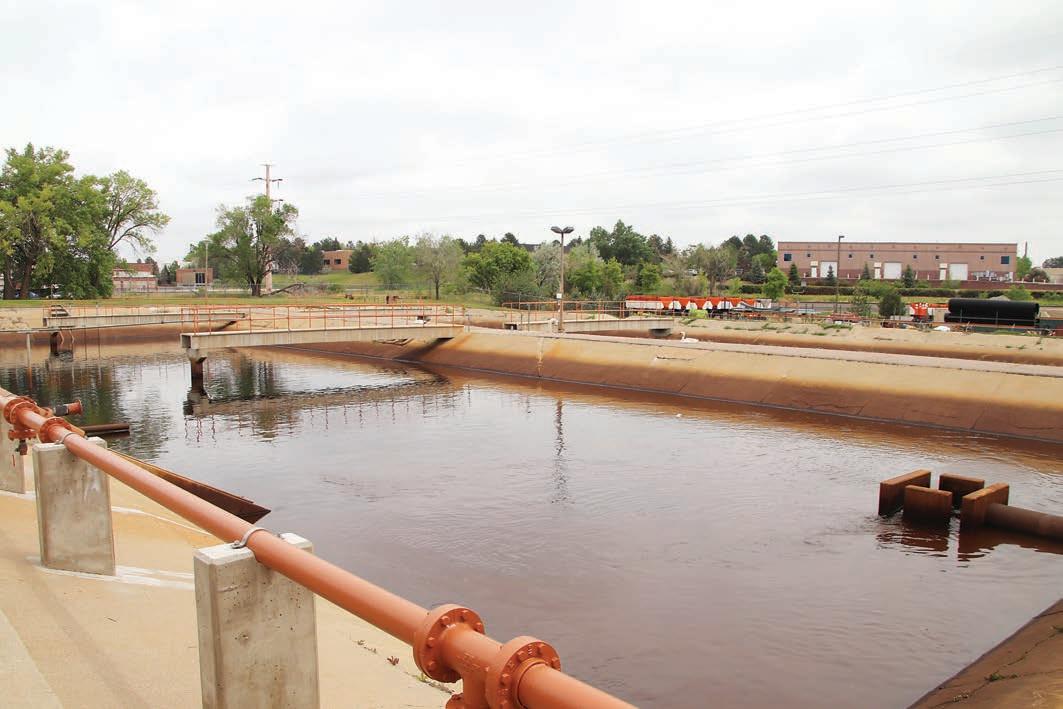
5 minute read
SEE GRANTS
Fix, enhance or replace are options city considers
City staff presented fi ve options to repair or replace the Semper Water Treatment plant at a June 20 Westminster City County study session.
“The Semper condition assessment shows needed repairs; this isn’t a big surprise,” said Stepanie Bleiker, capital projects administrator.
The most signifi cant and timely repairs needed are for electrical and structural concrete issues.
Bleiker presented fi ve options that built on each other. The fi rst was to rehabilitate Semper with the needed repairs and keep it as is.
The second would be to add resiliency to those repairs, Blieker said. That means adding the ability to redirect the water to be refi ltered if it is not clean enough to send to water customers, she said. Currently, Semper does not have that ability, and city staff has to shut down the plant very quickly if the water isn’t up to par.
The third would be to construct repairs, add resiliency and make Semper capable of treating water in diffi cult conditions, such as fl ooding, wildfi res or other events with more organics in the water.
The fourth and fi fth options called for replacing the plant, either near the current Semper plant or someplace else.
She noted that not all upgrades need to happen at one time. Staff can make room to add others in the future.
Mayor Pro-Tem David DeMott asked what the tradeoffs are for those services, and how much they would cost.
Bleiker said city staff is currently going through the design and calculating the cost estimate.
“There may be ways you take a single point of failure and say ‘putting in a parallel system may be more-than-makes-sense hypothetically,’ but there’s a way to make that point of failure less vulnerable,” she said.
The last two options were to rebuild the plant at either an adjacent site or along Westminster Boulevard, a site previous councils had selected for new treatment plant. Bleiker said these options would get rid of all the vulnerabilities and would not salvage the current plant.
“We’re excited to bring a range of costs because that’s what they will be ready for in August,” she said.
City Councilor Bruce Baker said the cost of the upgrades is the most important aspect to him. He faulted city staff for not producing the cost of the project at the meeting.
DeMott said he also wanted to know the cost but understands if the timeline is longer.
Scrap or upgrade
“I’m not sure I’m at the rehab piece, I think if we’re going to put this kind of money into this, we need to know this is going to func-

tion, the question for me is, ‘where is it going to go?’” Mayor Nancy McNally said.
City Councilor Obi Ezeadi agreed and said he is much more concerned with the rebuild options. He said he has rehabbed houses in the past, and there are always surprises.
DeMott said he wanted to look into how to update the site because all the pipes and other infrastructure already exist there. He has noted the high price tag of laying pipes to an entirely new facility in past meetings. However, if that’s not possible, he wants to see the different costs of rebuilding.
“I’m thinking rebuild within the site, and if that’s not the right site because it’s too cost-prohibitive, tell me what’s less,” he said.
“Staff has said costs come along with the process, and we will deliver them to you at a time when there’s a confi dence interval you can rely on,” Interim City Manager Jody Andrews said.
A section of Westminster’s Semper Water Treatment Plant.

PHOTO BY LUKE ZARZECKI


GRANTS
FROM PAGE 1
local solutions that address housing and expand economic opportunities for low to moderate-income persons.
Cities across the country receive funds based on the U.S. Census and poverty measures. To be used, the money must meet one of three objectives laid out by the U.S. Department of Housing and Urban Development. It must benefi t low and moderate-income persons, aid in the prevention or elimination of slums or blight and/or meet a need having a particular urgency.
An area is considered low or moderate-income when 51% or more people living within the area earn less than 80% of the median income.
Westminster received $585,031 in funds for the 2022 program year. Council hopes to hear from the community about how to spend it.
“We want to use this money to work with our community, not do things to our community,” Tayer said.
Mayor Pro-Tem David DeMott brought some ideas to the meeting, which included helping residents with city suggestions, such as replacing a lawn with a xeriscaping.
Another was to assist residents with auto repairs, such as a stolen catalytic converter. He said that came from a discussion at the beginning of the meeting regarding crime, when City Councilor Obi Ezeadi said low-income people are more affected by those thefts than higher income individuals.
Ezeadi agreed with DeMott’s suggestions.
A community meeting was held June 22 to hear ideas, and a public hearing paired with a council vote is scheduled for July 25.
“I just want the community to hear that their voice will be heard, instead of ‘here’s the plan, and we can only talk about this,’” said Mayor Nancy McNally.

